
Subjects Inside: Article
V Applications
FAQ,
Application Counts By
Congress, Articles,
AVC Legislative Report, CRS Reports,
Convention of State, Compact for America, COS, CFA--Which States are Which?, The Historic Record of COS, COS, CFA Laws, COS Articles, CRS Reports on COS/CFA, COS, CFA Financial Records, CFA Financials, COS Financials, COS/CFA Financial Conclusions, John
Birch Society, Con-Con, Runaway
Convention, Who Called the Convention, Congressional
Vote on a "Runaway" Convention, "Obey
the Constitution, Only Two More States", Illegal Rescissions, The Phony Burger Letter, The
Madison Letter, Fotheringham Exchange, JBS Articles, Sibley
Lawsuit, General Interest, Article V.org,
Robert Natelson, History
of Article V, Counting the Applications, The Numeric Count History, Congressional Decision of May 5, 1789,
Development of Article V, The Committee of the Whole, The Committee of Detail, August 30, September 10, Committee of Style, September 15, Official Government Documents,
History of FOAVC, Founders,
Audio/Visual,
Links,
Contact
Us, Legal
Page, 14th Amendment, The Electoral Process, Packets,
Definitions,
Numeric, (
Applications grouped by numeric count as required by the Constitution),
Same Subject (Applications grouped by amendment subject, not required by the Constitution for a convention call).
Go To Page 6: B, C, D, E, F, G Return to Page 6
Page 6 A--Continuing The Discussion of JBS, Eagle Forum
Introduction
A persistent objection
to
an Article V Convention presented by JBS/Eagle Forum is an Article
V Convention is some kind of constitutional "con" is being played on
the
American people. Rather than recognize the convention as a
constitutional requirement, JBS/Eagle Forum insists the
convention is a "bad idea." Their rhetoric implies this constitutional
clause can be
disregarded if desired.
JBS/Eagle Forum does not inform the public of
the fact the states have long since satisfied the two thirds
requirement of Article V. Thus a convention call is mandated. JBS/Eagle
Forum have never
presented any evidence proving the convention clause of Article V can
be disregarded or vetoed. FOAVC believes the convention
clause, like the rest of the Constitution, is not "bad idea" but a
binding constitutional
requirement. None of the Constitution may
be disregarded or vetoed. Thus whether it is a "bad idea" is irrelevant
as it is a constitutional mandate.
JBS/Eagle Forum says a present day Article V Convention will become a "runaway" convention, just
like, they say, the Federal Convention of 1787 was. FOAVC will examine the premise in detail. Rather than quoting the correct
constitutional language of
"convention for proposing amendments" or more familiar
"Article V Convention" to describe the convention amendment process of Article V, JBS/Eagle
Forum instead refers to an Article
V Convention as a "constitutional convention" or "con-con."
This
"error" is part of a clever marketing technique intended
to convey the subliminal message a "con-con" is a "con" on the
American people. JBS bases their "title" on their interpretation of
historic events which JBS/Eagle Forum believes occurred at the Federal
Convention of 1787. JBS/Eagle Forum has never provided evidence proving these events will
occur if an Article V Convention is called.
JBS/Eagle Forum freely use the term "constitutional convention" describing both the 1787 Convention and
an Article V Convention. This notion was emphatically rejected by a formal vote of the Federal Convention of 1787. JBS/Eagle Forum freely apply the term "runaway" to both conventions. The
two events are separated by at least two centuries and by two different forms
of government. To avoid any confusion
between reference to these two separate events throughout this part of
the site, FOAVC will refer to the 1787 Convention as the Federal
Convention of 1787, as used by Professor Max Farrand in his seminal
work, "The Records of the Federal Convention of 1787." A reference
to the convention required under the present Constitution will be termed as an "Article V
Convention" or "amendments convention." The general word "convention" will
always refer to the title reference of that sentence or paragraph.
"Constitutional Convention (Con-Con) and the "Runaway Convention
JBS states on its website:
"Article V of the Constitution is clear about the two ways to pass
amendments. Also clear is what happened in 1787 when the Constitution
was written. The convention to amend the Articles of Confederation
wrote an entirely new Constitution, which was outside of its scope.
Ratification rules were rewritten in order to ensure passage. Are we
confident that the Constitution would not be rewritten and ratification
rules not thrown out? The John Birch Society stands opposed to calling
for a convention, but supports amending the Constitution through
Congress. However, the better solution is to obey the Constitution to
rein in the federal government, not amend a document that is ignored."
JBS/Eagle Forum therefore presume the following about an Article V Convention:
The Article V Convention described in the
United
States Constitution is identical to that of the Federal
Convention of 1787 despite there being no language in the
Articles of Confederation referring to a convention of any description
nor any language in the Constitution referring to a "constitutional
convention," the term JBS/Eagle Forum apply equally to describe both forms of conventions.
JBS/Eagle
Forum believe the Federal Convention of 1787 was limited to only to
"amend" the Articles of Confederation (meaning that when finished the
Articles of Confederation would have remained as the ruling form of
government in America) and not authorized to propose a new Constitution. While the Constitution refers to "amending"
the Constitution, the Articles of Confederation refer to "alteration"
of the document.
JBS/Eagle Forum believes the Federal Convention
of 1787 instead wrote a new Constitution which it had no authority
[scope] to do.
Technically
JBS/Eagle Forum accuse two
future presidents of the United States (Madison and Washington) and
numerous other historic figures of that period of insurrection
against the Government of the United States in that these men willfully
attempted to overthrow the legal
form of government in place at the time (the Articles of Confederation)
without due process of law and replace it with an unauthorized new form
of government.
There is no record of any person who
participated in the Federal Convention of 1787 being charged with
insurrection against the Government of the United States.
In writing an unauthorized Constitution JBS/Eagle Forum believe the Federal Convention of 1787 became a "runaway" convention.
JBS/Eagle Forum coined the term "runaway"
convention to describe unauthorized actions by a convention contrary to
instructions given it either by Congress or the states.
The term had never been in general use to describe the Federal
Convention of 1787 until the start of the JBS/Eagle Forum
anti-convention campaign.
JBS/Eagle
Forum believes the Federal Convention
of 1787 rewrote the ratification rules of the Articles of Confederation
to ensure passage of the new Constitution.
This statement is incorrect. The
Federal Convention of 1787 wrote a ratification rule for the proposed
Constitution but made no mention of changing the ratification rule of
the Articles of Confederation.
Article VII of the Constitution describes ratification for the Constitution. It is one sentence long:
"The Ratification of the Conventions of nine states, shall be
sufficient for the Establishment of this Constitution between the
States so ratifying the Same."
Article 13 of the Articles of Confederation
described the "alteration" process of the Articles of Confederation:
"Every State shall abide by the determination of the United States in
Congress assembled, on all questions which by this confederation are
submitted to them. And the Articles of this Confederation shall be
inviolably observed by every State, and the Union shall be perpetual;
nor shall any alteration at any time hereafter be made in any of them;
unless such alteration be agreed to in a Congress of the United States,
and be afterwards confirmed by the legislatures of every State."
As JBS/Eagle Forum believes the Federal
Convention of 1787 exceeded its authority with the proposal of a new
Constitution and ratification and was not authorized by Congress to do
so, JBS/Eagle Forum believes the same thing will occur if Congress
calls an Article V Convention. As
will be discussed JBS/Eagle Forum never mentions the fact Congress
considered the question of whether the convention exceeded its
authority and was therefore a "runaway" on September 27, 1787. Congress
officially determined the convention was not a "runaway."
JBS/Eagle Forum support amendment of the Constitution but only if such amendment is proposed by Congress.
JBS/Eagle Forum
ignore the fact Congress and an Article V Convention have identical amendment proposal powers. If, as JBS/Eagle Forum contends,
"the Constitution can be
rewritten and
ratification
rules ... thrown out" by a "constitutional convention," and Congress
has the
identical
authority under Article V, JBS/Eagle Forum has never explained how
Article V prevents Congress from becoming a "runaway" Congress but
allows an Article V Convention to be a "runaway" convention.
JBS/Eagle Forum believe the federal government
ignores the Constitution and by doing so exceeds the authority granted
it by the Constitution with the creation of excessive rules (regulations), laws and
court rulings which interfere with the daily lives of Americans.
Other
than not calling an Article V Convention
when required to do so, there is no record the United State
Government (not an individual within that government) has ever violated
a single provision of the United States Constitution. The question of
violation of the Constitution by the government is not whether regulations, laws
or court rulings politically unfavored by some should exist. When discussing
violation of the United States Constitution by the government, the
question is whether such regulations, laws and rulings can exist under the terms of the Constitution.
JBS/Eagle Forum has never presented any evidence proving
the United States Government regulations, laws or
court rulings it politically opposes cannot
exist under one or more provisions of the United
States Constitution. JBS/Eagle Forum have presented no evidence the
United State Government has ignored the Constitution in the creation of
these regulations, laws and court rulings. Instead the evidence appears
to prove the government has made constitutionally based decisions which
politically JBS/Eagle Forum oppose but which the groups have no evidence proving are unconstitutional.
JBS/Eagle Forum believe the solution to our national problems "is
to obey the Constitution to
rein in the federal government." In direct contrast to its "support the Constitution as is" theme JBS/Eagle Forum oppose calling an Article V
Convention when Article V clearly mandates Congress is peremptorily
required to do so. This dichotomy is only explained if it is accepted JBS/Eagle Forum believe the Government can veto the Constitution when JBS/Eagle Forum politically agree with that decision. JBS/Eagle
Forum have never explained how by having the federal government veto
the Constitution this will further its solution of the government
"obeying the Constitution."
As JBS/Eagle Forum intertwine "runaway" convention and a
"constitutional convention" these two JBS/Eagle Forum concepts will be
discussed jointly. Any examination of whether the Federal Convention of
1787 was a "runaway" and what authority it possessed must begin by
examination of the convention call issued by Congress on February 21,
1787. As shown below in photographic copies of Journals of Congress,
the official record of the Congress during the Articles of
Confederation, the first resolution proposed by New York on
February 21, 1787 was defeated. The second, proposed by the state of
Massachusetts, was enacted by Congress and specified the authority of
the Federal Convention of 1787.
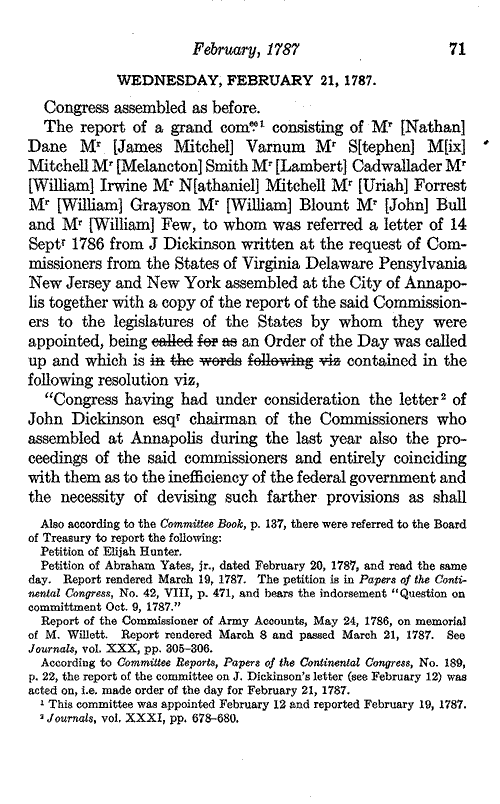
|
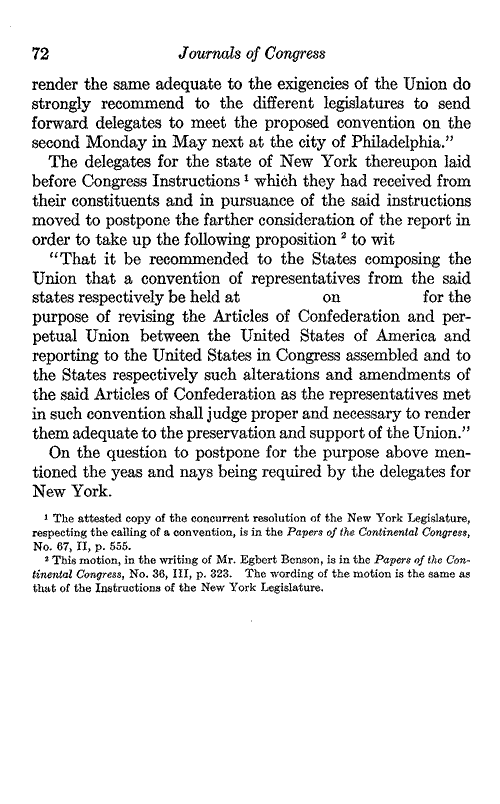
|
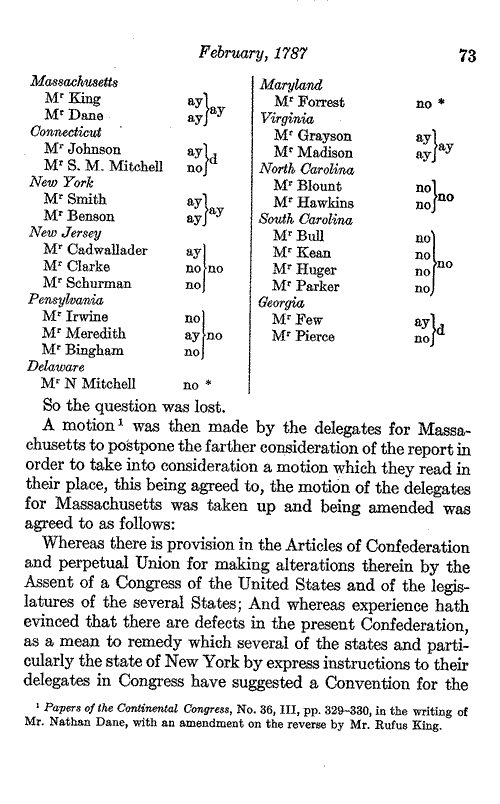 |
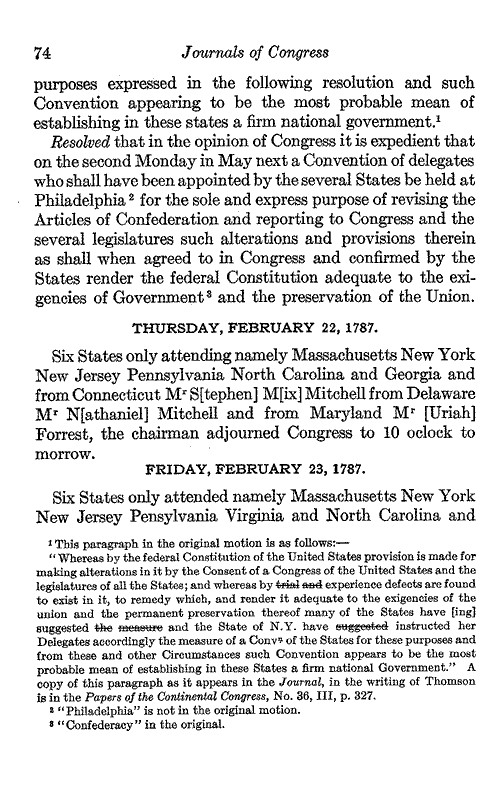
|
JBS/Eagle Forum incorrectly uses the word "amend" to
describe the congressional authorization for the Federal Convention of
1787. The convention call of February 21, 1787 did not state the Federal
Convention of 1787 was authorized to "amend" the Articles of
Confederation nor did it use the word "alteration" [a form of the
word "alter] which is the word used in the Articles of Confederation.
Instead Congress specifically used the word "revising" (a form of the
word "revise") in its February
21, 1787 convention call.
Congress required the "alterations and provisions therein"
[recommendations of the convention] (plural) to render the "federal Constitution
adequate to the exigencies of Government" be sent to Congress.
A brief
discussion of the definitions of the words "agree" "alter", "amend" and
"revise" can be read on our Definitions page.
In sum, the word "revise" demonstrates congressional
consent in allowing the convention whatever latitude required in
order to "render the federal Constitution adequate to the exigencies of
Government." As discussed further on our Definitions
page, the word "revise" implies a comprehensive overhaul of whatever is
being "revised." Congress understood the meaning of this word.
As such
Congress reasonably understood such "revision" might include an entire
new version of the Articles of Confederation in order to redress the
multiple problems of government which existed under the current
Articles of Confederation. In other words for the convention to
accomplish the task assigned it ("render the Constitution adequate to
the exigencies of Government") Congress understood this might require massive changes
in the Articles of Confederation.
The requirement the Federal Convention of 1787 present their
recommendations ("alterations and provisions") to Congress was in
respect to the requirements of the
Articles of Confederation. The Articles mandated any "alteration" to
the Articles be first "agreed" to by Congress then ratified by all 13
states. The language of the February 21, 1787 call made it abundantly
clear more than one
"alteration" was expected from the convention. This fact was the
primary motivation for the convention writing a new
Constitution--that each proposed alteration in the language of the
Articles of Confederation required unanimous
consent from all 13 states to take effect.
The problem was the state of Rhode Island which consistently refused to consider any changes
whatsoever to the Articles of Confederation and rarely sent
representatives to Congress. These two political tactics essentially
allowed Rhode Island to hold the rest of the nation political
hostage unable to
redress national problems as they occurred. The prospect of a Rhode
Island veto on any proposal(s) the Federal Convention of 1787 might
advance
was clearly on the convention delegates' minds as shown through
numerous references in the records of the Federal Convention of 1787.
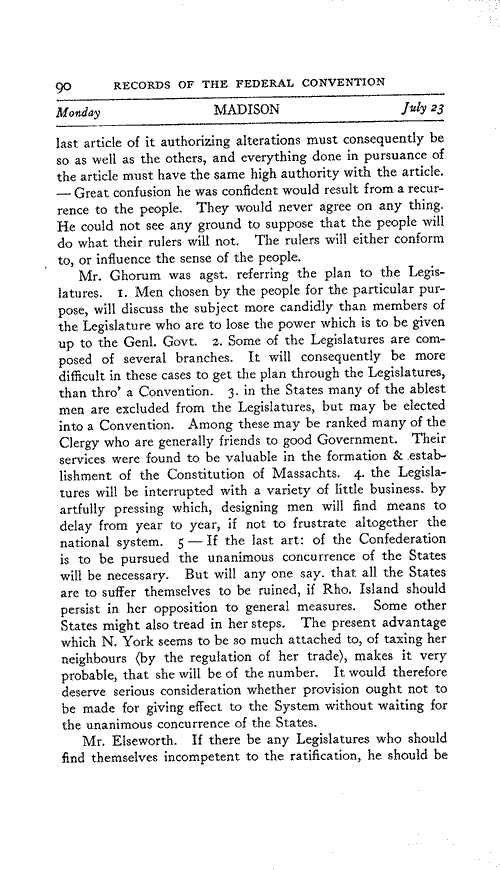 An example of this thinking can be read by clicking the page image beside this
paragraph taken from Farrand's "Records of the Federal
Convention of 1787 (Volume II, page 90). By
the time of this example (Monday, July 23, 1787) the decision to
propose a new "system" of
government--the Constitution--had long since been made by the
delegates. All recommendations were therefore placed in a single
political basket. This decision had the advantage of satisfying the
terms of the Articles of Confederation which only permitted
a single "alteration" (rather than "alterations") "at any time" to the
Articles ["nor shall any alteration at any time hereafter be made in
any of them [the Articles]; unless such alteration be agreed to in a
Congress of the United States, and be afterwards confirmed by the
legislatures in every State."] Thus,
"at any time" only one "alteration" could be proposed to the Articles.
An example of this thinking can be read by clicking the page image beside this
paragraph taken from Farrand's "Records of the Federal
Convention of 1787 (Volume II, page 90). By
the time of this example (Monday, July 23, 1787) the decision to
propose a new "system" of
government--the Constitution--had long since been made by the
delegates. All recommendations were therefore placed in a single
political basket. This decision had the advantage of satisfying the
terms of the Articles of Confederation which only permitted
a single "alteration" (rather than "alterations") "at any time" to the
Articles ["nor shall any alteration at any time hereafter be made in
any of them [the Articles]; unless such alteration be agreed to in a
Congress of the United States, and be afterwards confirmed by the
legislatures in every State."] Thus,
"at any time" only one "alteration" could be proposed to the Articles.
By creating a single constitution, the Federal Convention of 1787
presented one proposal requiring one ratification
vote and resulting in one alteration to the Articles of Confederation,
all to counter the expected veto by Rhode Island. The state could
have easily raised the single factor limitation ("any alteration
instead of alterations") and thus defeated all but
one proposal by asserting the Articles only allowed for "an alteration
at any time" had they been introduced separately but simultaneously by
the convention. Learning from this
mistake the Founders carefully avoided this grammatical trap and
allowed for proposal of "amendments" rather than "amendment" in Article
V with no time factor described.
Because of the change in language Congress was able to propose the Bill
of Rights--12 amendment proposals--simultaneously under the
Constitution. The 12 proposals still required individual ratification by
the states. This fact of constitutional law demonstrates irrefutably while both proposal bodies under
the Constitution have authority to propose multiple amendments simultaneously (thus
addressing multiple issues not necessarily related to one another as
was the case with the Bill of Rights) each proposal is considered
separately in ratification. The fact Congress proposed 12 amendments
was irrelevant until
the states ratified ten of the proposed amendments (and much later an
eleventh). The political climate of that time required multiple
amendments; whether it will occur again either through Congress or a
convention will be determined by the people. JBS/Eagle Forum have never
asserted that Congress, in proposing the Bill of Rights became a
"runaway" Congress.
Examination of the text of
Articles of Confederation preclude the JBS/Eagle Forum statement the
Federal Convention of 1787 had authority to
"amend" the Articles of Confederation. Under the terms of the Articles
the Federal
Convention of 1787 had no authority to do anything except make a
non-binding
recommendation for "revising" the Articles of Confederation. The
Articles clearly state Congress was required to "agree" to any proposal
and then
the proposal was forwarded to the states for consideration. The public
record clearly demonstrates ultimately Congress "agreed" to the
recommendations of the Federal Convention of 1787. Thus,
Congress and the states had the power to "amend" the Articles, not the
convention.
If Congress "disagreed" with a proposed "alteration" it would not be forwarded to the
states for consideration. The
Articles made no exception for a convention to take
the place of Congress and propose an "alteration" to the Articles. There is no mention of authority to
bypass Congress and submit their proposal directly to the states. While
the convention may have written the proposal, under the law in effect
at that time, Congress, not the Federal Convention of
1787, proposed the Constitution (including its ratification process)
to the states for their consideration by "agreeing" to it. As discussed
later, this fact was clearly understood by the members of Congress.
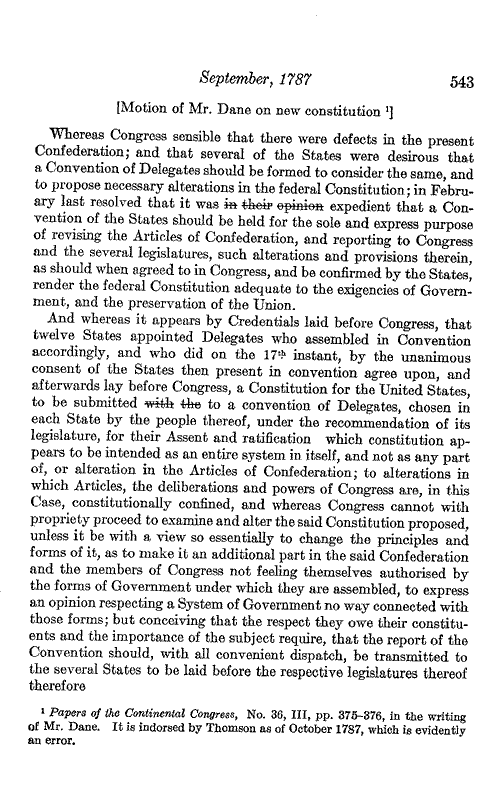
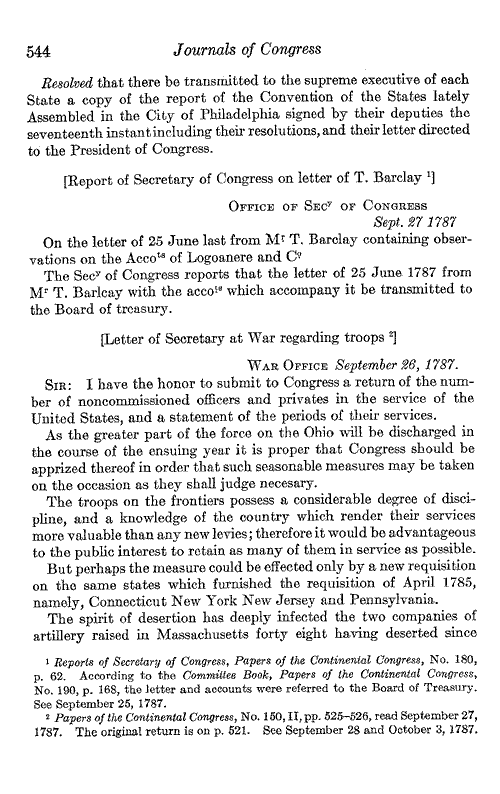 The
word "agree" has several meanings only one
of which is to "have the same opinion about something; concur." You can
also "agree" to "something that has been suggested by another."
Congress took advantage of this fact. Congress "agreed" to recommend
the proposal by the Federal Convention of 1787. Ultimately
Congress "agreed" the Articles of
Confederation could be "revised" as proposed by the Federal
Convention of 1787 but specified the decision to do this was to be by
vote of the people in representative conventions. (See images at left
of one of the motions (ultimately rejected) made on September 27, 1787
regarding the proposal).
Thus the Articles
were to be abandoned
(assuming approval by the people), even though several sections of the
Articles were copied into the new Constitution (as well as direct
reference to debt under the Articles being transferred to the new
government), and replaced with a new form
of
national government which Congress believed (by transmitting the
proposal to the states for consideration) would "render the federal Constitution adequate to the exigencies of
Government
and preservation of the Union."
The
word "agree" has several meanings only one
of which is to "have the same opinion about something; concur." You can
also "agree" to "something that has been suggested by another."
Congress took advantage of this fact. Congress "agreed" to recommend
the proposal by the Federal Convention of 1787. Ultimately
Congress "agreed" the Articles of
Confederation could be "revised" as proposed by the Federal
Convention of 1787 but specified the decision to do this was to be by
vote of the people in representative conventions. (See images at left
of one of the motions (ultimately rejected) made on September 27, 1787
regarding the proposal).
Thus the Articles
were to be abandoned
(assuming approval by the people), even though several sections of the
Articles were copied into the new Constitution (as well as direct
reference to debt under the Articles being transferred to the new
government), and replaced with a new form
of
national government which Congress believed (by transmitting the
proposal to the states for consideration) would "render the federal Constitution adequate to the exigencies of
Government
and preservation of the Union."
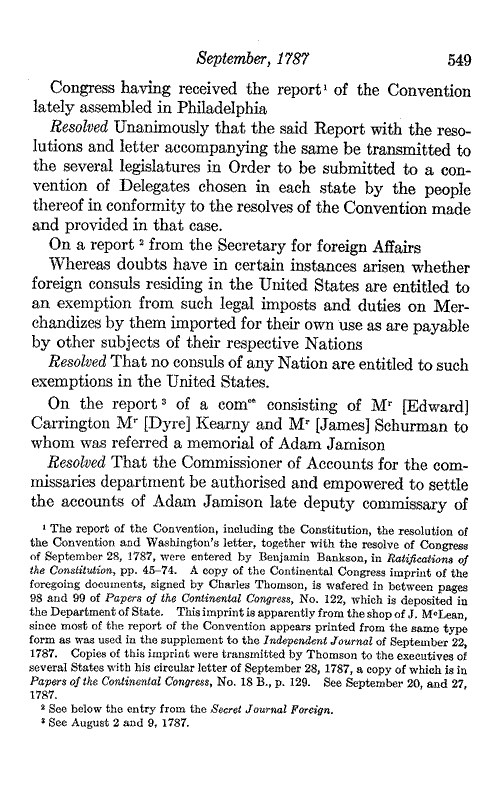 In the message sent to the states on September 28, 1787 Congress unanimously acceded to the ratification request by the
convention and submitted the proposal to the states requiring the
proposal be considered by elected conventions. (See image left, click to enlarge). While JBS/Eagle Forum
characterizes this as proving the convention was a
"runaway," public record proves them wrong. Article XIII of
the Articles of Confederation states, "Every State shall abide by the
determination of the United States in Congress assembled, on all
questions which by this confederation are submitted to them." The
question of whether to forward the Constitution to the states for
consideration and under
what circumstance and conditions this was to be done, was, under the
terms of the Articles, entirely controlled by Congress.
Congress therefore was completely within its rights
bestowed it by the Articles of Confederation when it "agreed" to
forward the proposed constitution
to the states for ratification by elected conventions as
requested by the Federal Convention of 1787. Acting in compliance with
this binding determination by Congress given it by the Articles (not
the Constitution), all
state legislatures drafted laws creating ratification
conventions, held public elections, and used public funds to pay for
convention expenses. Finally, all state legislatures voted to accept
the convention vote as their own. They thus reported favorably back to
Congress as a vote of that state.
In the message sent to the states on September 28, 1787 Congress unanimously acceded to the ratification request by the
convention and submitted the proposal to the states requiring the
proposal be considered by elected conventions. (See image left, click to enlarge). While JBS/Eagle Forum
characterizes this as proving the convention was a
"runaway," public record proves them wrong. Article XIII of
the Articles of Confederation states, "Every State shall abide by the
determination of the United States in Congress assembled, on all
questions which by this confederation are submitted to them." The
question of whether to forward the Constitution to the states for
consideration and under
what circumstance and conditions this was to be done, was, under the
terms of the Articles, entirely controlled by Congress.
Congress therefore was completely within its rights
bestowed it by the Articles of Confederation when it "agreed" to
forward the proposed constitution
to the states for ratification by elected conventions as
requested by the Federal Convention of 1787. Acting in compliance with
this binding determination by Congress given it by the Articles (not
the Constitution), all
state legislatures drafted laws creating ratification
conventions, held public elections, and used public funds to pay for
convention expenses. Finally, all state legislatures voted to accept
the convention vote as their own. They thus reported favorably back to
Congress as a vote of that state.
In this manner
both the conventions and the state legislatures voted in favor of the
proposed "alteration" to the Articles of Confederation. This satisfied
not only the terms of the Constitution but the Articles
of Confederation as well. The proposed Constitution was ratified twice;
once under the terms of the Constitution and once under the terms of
the Articles of Confederation. In all respects therefore, according to
public record, the Constitution was properly ratified and the Articles
properly altered.
Page Last Updated: 9-APRIL 2017







 An example of this thinking can be read by clicking the page image beside this
paragraph taken from Farrand's "Records of the Federal
Convention of 1787 (Volume II, page 90). By
the time of this example (Monday, July 23, 1787) the decision to
propose a new "system" of
government--the Constitution--had long since been made by the
delegates. All recommendations were therefore placed in a single
political basket. This decision had the advantage of satisfying the
terms of the Articles of Confederation which only permitted
a single "alteration" (rather than "alterations") "at any time" to the
Articles ["nor shall any alteration at any time hereafter be made in
any of them [the Articles]; unless such alteration be agreed to in a
Congress of the United States, and be afterwards confirmed by the
legislatures in every State."] Thus,
"at any time" only one "alteration" could be proposed to the Articles.
An example of this thinking can be read by clicking the page image beside this
paragraph taken from Farrand's "Records of the Federal
Convention of 1787 (Volume II, page 90). By
the time of this example (Monday, July 23, 1787) the decision to
propose a new "system" of
government--the Constitution--had long since been made by the
delegates. All recommendations were therefore placed in a single
political basket. This decision had the advantage of satisfying the
terms of the Articles of Confederation which only permitted
a single "alteration" (rather than "alterations") "at any time" to the
Articles ["nor shall any alteration at any time hereafter be made in
any of them [the Articles]; unless such alteration be agreed to in a
Congress of the United States, and be afterwards confirmed by the
legislatures in every State."] Thus,
"at any time" only one "alteration" could be proposed to the Articles.

 The
word "agree" has several meanings only one
of which is to "have the same opinion about something; concur." You can
also "agree" to "something that has been suggested by another."
Congress took advantage of this fact. Congress "agreed" to recommend
the proposal by the Federal Convention of 1787. Ultimately
Congress "agreed" the Articles of
Confederation could be "revised" as proposed by the Federal
Convention of 1787 but specified the decision to do this was to be by
vote of the people in representative conventions. (See images at left
of one of the motions (ultimately rejected) made on September 27, 1787
regarding the proposal).
Thus the Articles
were to be abandoned
(assuming approval by the people), even though several sections of the
Articles were copied into the new Constitution (as well as direct
reference to debt under the Articles being transferred to the new
government), and replaced with a new form
of
national government which Congress believed (by transmitting the
proposal to the states for consideration) would "render the federal Constitution adequate to the exigencies of
Government
and preservation of the Union."
The
word "agree" has several meanings only one
of which is to "have the same opinion about something; concur." You can
also "agree" to "something that has been suggested by another."
Congress took advantage of this fact. Congress "agreed" to recommend
the proposal by the Federal Convention of 1787. Ultimately
Congress "agreed" the Articles of
Confederation could be "revised" as proposed by the Federal
Convention of 1787 but specified the decision to do this was to be by
vote of the people in representative conventions. (See images at left
of one of the motions (ultimately rejected) made on September 27, 1787
regarding the proposal).
Thus the Articles
were to be abandoned
(assuming approval by the people), even though several sections of the
Articles were copied into the new Constitution (as well as direct
reference to debt under the Articles being transferred to the new
government), and replaced with a new form
of
national government which Congress believed (by transmitting the
proposal to the states for consideration) would "render the federal Constitution adequate to the exigencies of
Government
and preservation of the Union."  In the message sent to the states on September 28, 1787 Congress unanimously acceded to the ratification request by the
convention and submitted the proposal to the states requiring the
proposal be considered by elected conventions. (See image left, click to enlarge). While JBS/Eagle Forum
characterizes this as proving the convention was a
"runaway," public record proves them wrong. Article XIII of
the Articles of Confederation states, "Every State shall abide by the
determination of the United States in Congress assembled, on all
questions which by this confederation are submitted to them." The
question of whether to forward the Constitution to the states for
consideration and under
what circumstance and conditions this was to be done, was, under the
terms of the Articles, entirely controlled by Congress.
In the message sent to the states on September 28, 1787 Congress unanimously acceded to the ratification request by the
convention and submitted the proposal to the states requiring the
proposal be considered by elected conventions. (See image left, click to enlarge). While JBS/Eagle Forum
characterizes this as proving the convention was a
"runaway," public record proves them wrong. Article XIII of
the Articles of Confederation states, "Every State shall abide by the
determination of the United States in Congress assembled, on all
questions which by this confederation are submitted to them." The
question of whether to forward the Constitution to the states for
consideration and under
what circumstance and conditions this was to be done, was, under the
terms of the Articles, entirely controlled by Congress.